Update of the week page 2
Ruth McKee School of Business nears opening

Update of the week page 2
Ruth McKee School of Business nears opening
Pressing Issue page 7
Does Collegedale have a human trafficking problem?
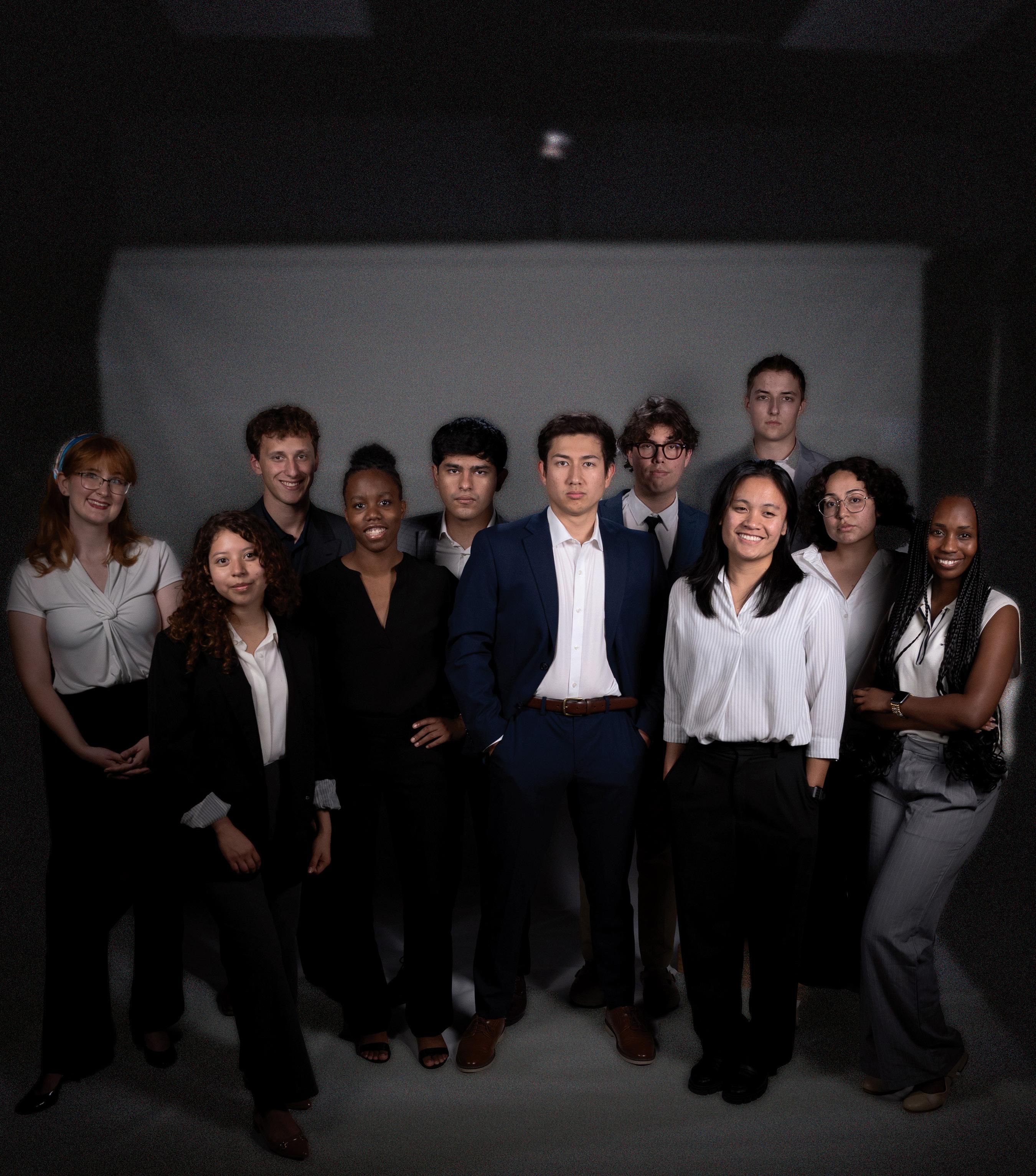
Chloe Smith News Editor
The Student Association (SA) has finalized its budget for the 2025-2026 school year, reflecting several notable changes to funds. With nearly $400,000 in projected revenue, the budget outlines how student fees and events will be invested in campus life.
Compared to the previous year’s Administration revenue of $420,750, this year’s Administration revenue is $379,440, according to a chart from Jaziel Soto, junior accounting major and SA vice president of finance. When adding all other revenue generated, the total revenue for this year amounts to $393,140. The new budget highlights reallocation, particularly in areas such as student clubs and media.
According to John Hargy, senior biophysics major and SA president, the most noticeable change is the doubling of funds for student clubs.
“We have doubled the amount that we are giving to clubs from $15,000 to

$30,000,” said Hargy. “We believe clubs are drivers of our campus culture and creating that space for students and a community. This is a reinvestment of SA funds back into our clubs to enable them to do programming, events, field trips [and] bring in speakers. We want to empower clubs to create their spaces.”
Hargy also emphasized that this represents the largest allocation to clubs in SA’s history, describing it as a reinvestment in community life.
Another notable change to the budget involved the loss of Memories, Southern’s student yearbook. For years, Memories carried one of the largest allocations in the SA budget with about $70,000. However, with the lack of an editor, SA chose not to produce a yearbook this year.
According to Soto, some departments will benefit from this change.
“The Memories budget used to be $70,000…and now we just cut it

“I want 100% transparency. We are working on a webpage to disclose all the expenses and show where the money goes.” - Jaziel Soto
Hayden Kobza Editor-in-Chief
On Thursday, Sept. 18, Southern Adventist University welcomed David Brooks, New York Times columnist and best-selling author, to campus for his lecture, titled "The Art of Seeing Others Deeply.” Brooks is also known as a longtime commentator on PBS NewsHour. Over the years, he has become one of America’s most recognizable public intellectuals, admired for combining sharp cultural analysis with a warm, witty and quietly profound tone.
Most recently, Brooks has gained acclaim for his bestseller “How to Know a Person: The Art of Seeing Others Deep-
Student Association
continued from page 1
to $36,000,” said Soto. “The money that we have remaining, we’re going to use it to improve some equipment for Strawberry Fest. It helps us a lot to have the money.”
According to the organization’s social media posts, Strawberry Festival is an endof-year event started in 1979 that showcases photos and videos recapping the school year.
Hargy also shared his perspective on the Memories budget being reallocated, noting that SA’s media teams will benefit.
“Our surplus will enable us to upgrade camera gear for Strawberry Fest and other media projects,” he said. “They’ve been working with older equipment, and this will let them buy new lenses and bodies so they can keep pro-
ly and Being Deeply Seen,” which offers practical and hopeful guidance on building stronger relationships in a divided world.
During his speach, Brook said there is a rise in mental health problems in the United States. He cited a study that found 36% of Americans report feeling lonely almost all the time. In addition, he mentioned a 30% rise in suicides and statistics that reveal 45% of teenagers persistently feel hopeless and despondent.
“The percentage of Americans who say they have no close personal friends is up by four-fold since 2000,” he said.
“The percentage of Americans without a romantic partner is
ducing high-quality content.”
According to Soto, the Southern Accent will also experience an increase in funds.
“[The Accent budget] was proposed to go down, but they asked us for more money,” he said. “I know they have different projects that they want to do with that money.”
Despite the advantages the change will bring, some students are not fond of the loss of a yearbook. Houston Beckworth, senior biblical studies major and member of the Senate finance committee, voiced his concerns.
“It was a bit disappointing to see that there was no one running Memories this year,” he said. “At the same time, other aspects of SA benefited, which is positive.”
According to Hargy, the decision not to have a yearbook came down to the lack of proper leadership.
“It would be nice to have a yearbook,” said Hargy, “but
up by a third since 2000. The percentage of Americans who rate themselves in the lowest happiness category is up by 50% since 2000. So, we've just become sadder.”
According to Brooks, when people are sad, they become meaner. He said when people feel unseen, they take it as a threat or an insult, and it results in the urge to lash out.
“I won't give you all the meanest statistics, but they're out there: the gun violence, the hate crimes, the rise of dark passions which dominate our political life today, anger, fear, hatred, resentment, the urge to dominate and the
without qualified leadership, it wasn’t realistic.”
Beckworth also mentioned his concern regarding international scholarships.
“It was frustrating to see that we would not be able to put any money into scholarships, including international scholarships, because of the things happening under the current American presidency,” said Beckworth.
“Still, other parts of SA benefited, and the overall budget continues to support student life in important ways, he said.”
Soto noted that some parts of SA underspent last year, which contributed to adjustments this year.
“Administration saw that not all funds were being used, so the budget was cut slightly,” he

said. “But most areas stayed the same.”
Jeaneva Bautista, senior accounting major and SA executive vice president, explained that the budget process involved balancing tradition and innovation.
“First, we have to look at what prior years have done and reflect on how they used their budget,” she said. “From that, we get an idea of what we want to do in the future. It’s a lot of moving things around. Whatever the finance VP has given us, we work with, and if we need more, we can collaborate with him to improve it.”
According to Bautista, this collaboration allows SA to adapt its resources to student needs. With an ever-changing budget, both Soto and Hargy expressed the importance of transparency. According to them, SA plans to launch a public website where students can view how every dollar is spent.
“I want 100% transparency,” said Soto. “We are working on a webpage to disclose all of the expenses and show where the money goes. A lot of things in the past were unclear, even for finance officers, but we want to change that. My main goal this year is to use the budget to its best potential and make sure students know how it’s used.”
Hargy shared similar sentiments to Soto’s regarding transparency.
“The budget will be public,” said Hargy. “Any student can look at it and see where their money is going. We are very thoughtful about how we spend, and we want maximum impact, funding projects that reach the most students.”
According to Hargy, Senate has not yet publicly posted the budget online but plans to release more information at a later date.
The Ruth McKee School of Business at Southern remains on track to open fall 2026. The new facility, now three years in the making, will house Southern’s business department, the school’s second-largest numer of majors.
“Funded entirely through the generosity of Southern alumni and friends, the project will be completed debt-free and without increasing tuition costs for students,” said Ellen Hostetler, vice president for Advancement.
Hostetler added that the building will provide a “space for innovation, entrepreneurship, classrooms, labs and an auditorium that serves both the business school and the wider campus.”
The project is on its original timeline to finish in summer 2026 and to open in fall 2026, according to Vincent Schober, associate vice president for Financial Administration and Facilities. Schober noted that the project’s most visible signs
of progress are on the horizon, with the installation of the grand staircase and windows.
Despite significant progress, construction has not been without setbacks. Danny Ford, the construction project manager, noted that the biggest challenge up until just a couple of months ago was the amount of rainfall that the area had through May and June.
“We actually set a rainfall record in May for the most rainfall measured in the month of May for this area,” Ford said. “It made working in the mud around the building difficult.”
According to Ford, the site itself also presented complications. Since the land was once a swamp, he had to devise “creative” solutions to keep the project moving forward, many of which drew on Ford’s agricultural background. In addition, the building’s close proximity to nearby roads left problems for construction efforts.
Regardless of the challenges, Ford highlighted new features of the building.
“A unique feature is the boardroom on the fourth floor,”
The Accent encourages readers to write articles and voice their opinions. However, the views expressed do not necessarily reflect the opinions of the Accent, the Southern Adventist University or the Seventh-day Adventist Church.
For any questions, comments and article submission information, email the editor at haydenjkobza@southern.edu.
For all advertising inquiries, email alvajohnson@southern.edu.
he said. “The university has never had an exclusive place for the board to meet.”
The building will also include a versatile lecture hall that can be rearranged for a variety of student uses. One of its most striking features is its design, emphasized by large windows that fill the space with light. The facility will also provide study rooms on every floor along with classrooms.
“I’m just excited to see it com-
pleted,” Ford said, “and see how all of it comes together.”
Students are looking forward to the changes as well.
“Brock Hall is too cramped,” Braden Larsen, a sophomore marketing major, stated. “The building will look good at the university entrance.”
Ford explained that overcoming obstacles has made the process more rewarding. According to him, his solutions were able to quietly save the
university some money. He also encouraged students to remain patient throughout this process.
“Improvement sometimes takes longer than you think,” Ford said. “Southern is dedicated to providing education in the best environment possible. This building is another example of how Southern is dedicated to Christ-centered, well-rounded education.”

Madelynn Brower Contributor
Since 1967, Southern Adventist University has been sending student missionaries to countries around the world. This year, the university has added two new locations in Uganda and the Fiji Islands.
One of the new mission locations in Uganda is located near the western border between Uganda and Congo. This mission, titled OurGanda, serves among 13 remote mountain villages in the Bundibugyo area, offering medical help and support. Most of the students who travel on this mission are pre-medicine and nursing students who train with groups of local doctors in the OurGanda clinics. This year, there are four student missionaries from Southern at OurGanda.
Student missionary Ana Korac shared her experience in an email to the Accent.
“Each clinic, we start with an educational presentation (the four of us students have been presenting on nutrition),” she stated, “and then we act out
a Bible story for them as well. Then we are divided up, either to do triage, shadow the medical officers and doctors or help dispense the medications at the pharmacy station.”
In addition to providing medical aid, OurGanda has an ongoing mission to help prevent child and spousal abuse among remote villages.
According to Byard Parks, director of student missions at Southern, OurGanda has often found unique measures to do so, including working with the local government to help enforce Ugandan laws against domestic violence. Their efforts have led to the formation of the ManKind club, an anti-abuse club for formerly abusive husbands among the mountain villages, which now has over a thousand members. Similar efforts are being taken to help prevent child abuse.
The second new location is in the Fiji Islands, where student missionaries are sent to one of the main islands first, then by boat to another smaller island an hour away. This smaller island is home
to a Seventh-day Adventist school, where the missionaries work with health clinics, teach at the school and do evangelistic outreach.
Parks stated that this year the university has 65 missionaries around the world and hopes to continue growing that number. He also said that while foreign exchange students cannot go as student missionaries due to difficulties getting back in the country, many students from Southern are still willing to serve overseas.
“[A] high priority is that stu-
dents are in [a] location where they receive mentoring and gain personal growth,” said Parks. “SM [student missionary] life is transformational.”
Some of the most popular student missionary destinations include the islands of Micronesia, Riverside Farm Institute in Zambia and other locations in Bolivia.
According to Parks, there are always new places that need more volunteers.
“Every week I get about two phone calls or two emails from some Adventist organization that’s looking for
volunteers...that’s a hundred a year,” he said.
Among the available mission fields are schools, orphanages and other humanitarian sites around the world.
Parks also requested continued prayers for the mission work of Southern.
“[Pray that] the mission understanding and spirit on Southern’s campus could grow to undertake new types of work in unreached and hard areas of the world.”
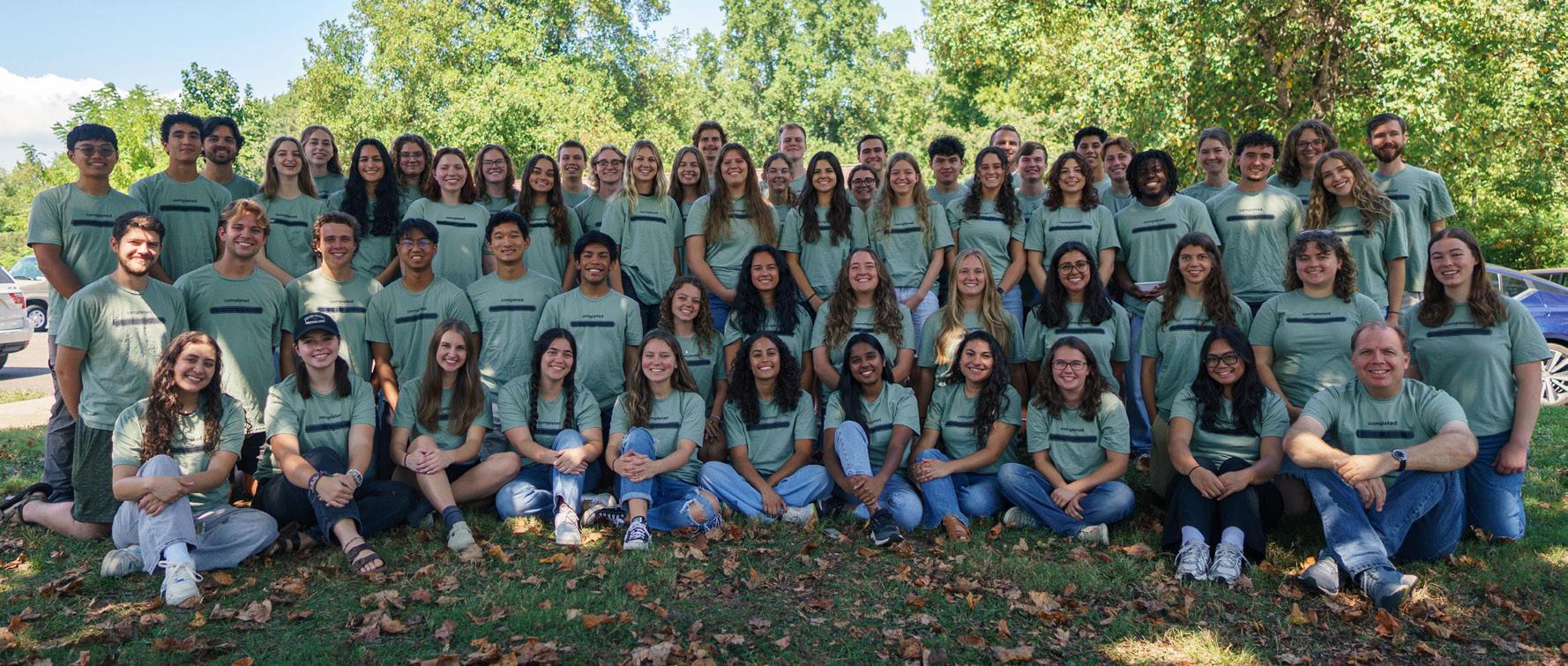
Anaya Miller Contributor
For the past few months, Kurt Miyashiro, associate professor at Southern Adventist University’s School of Music, has been writing a musical exploring the themes of fate, destiny and love.
The musical, titled King of Me, will be performed in the winter semester in Mabel Wood Hall’s Ackerman Auditorium. Due to limited seating, the School of Music will charge $5 per ticket.
Miyashiro was first contacted about the musical by Rick Shiomi, award-winning Japanese Canadian playwright and artistic director. Shiomi’s plan was to collaborate with Miyashiro to write a musical based on Pedro Calderón de la Barca’s Life is A Dream, but to use an Asian setting.
Upon receiving full rights to the story last summer, Miyashiro changed the narrative to a frame story, focusing the plot on six theater students who are writing a play set in 16th cen-
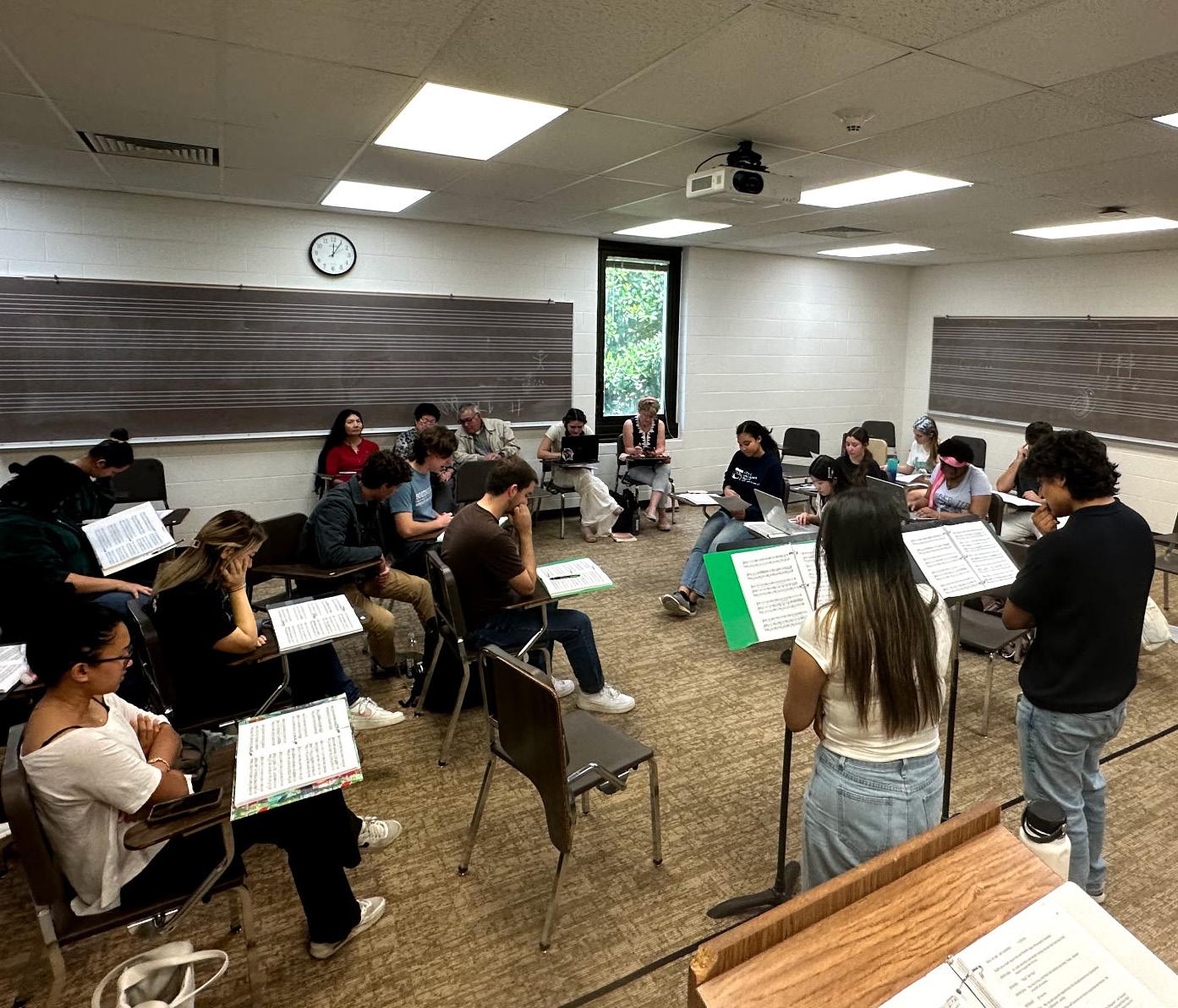
David Brooks visit continued from page 2
deepest product of this is the loss of trust,” Brooks said. Brooks also described how being online more causes people to see others less.
“ Social media is driving us all crazy,” Brooks said.
Gisela Harter, sophomore general studies major, agreed with Brooks that people need to disconnect from online to better connect with each other.
“I think a good way is taking breaks from our phones,” Harter said. “To be honest, I usually have hours in the day where I [won’t] be on my phone, and it just really helps me focus on other things. [It] rejuvenates me.”
During the event, Brooks stated that there are two types of people—diminishers and illuminators.
“Diminishers are people who aren't curious about you,” Brooks said. “They stereotype, they ignore. ...I met a woman who was a big Trump supporter, who was a lesbian biker who converted to Sufi Islam after surviving a plane crash.
It's like, what stereotype does she fit into?”
He then described the opposite side. “Illuminators on the other hand, are the people who really make you feel seen.”
To become someone who truly wants to know others, Brooks recommends finding the disagreement under the disagreement.
“If you're disagreeing about something, you can shout at each other, but it's more fun to say, well, why are we disagreering,” he said. “What philosophical reason deep down is causing this disagreement, that's finding the disagreement under the disagreement, and then the final thing that makes me a great conversationalist is to be really good at asking questions.”
His sentiments resonated with Ely Cervantes, freshman journalism major. In an interview with the Accent, she spoke about how people need to put aside their differences in order to see the bigger picture.
“Find a common ground instead of just arguing and you can talk about it better,” Cervantes said. “... Instead of just
tury Japan. He also wrote some of the music, adjusting already written pieces to fit his chosen themes.
The School of Music is collaborating with the School of Visual Art and Design (SVAD) for the first time to produce Miyashiro’s musical. Jesse Rademacher, associate professor of animation, is in charge of staging and directing, while adjunct professor for drawing, oversees The cast of the musical is made up of current students and alumni, most of which are from the School of Music. To include more people, Miyashiro double-cast the musical, resulting in two sets of lead actors.
Clarissa Tching, senior music education major, is the main director of the company of students. Adriana Esteves, a sophomore voice performance major, is a supporting lead actress. Allyson Stirewalt, a senior nursing major, and Nacor Lantigua, a voice performance alum, are the lead actors.
Esteves commented on one main character’s arc throughout the narrative of the musical.
“I like to say that she does find what she wants for herself after being put under so much pressure,” Esteves said. “Since I
reacting right away, you can approach it more calmly and have a real conversation about it. It’s important so that you can be more open minded to other people's perspectives...”
also have a lot of stress, I want to know that, in the end, I’ll live my life too and not be worried about what comes next.”
In an interview with the Accent, Stirewalt shared her experience as the lead.
“I auditioned back in March, and it was a really fun process of singing the compositions and finding out that I was cast as a main character,” she stated. “While I’ve never done theater before, it is so interesting to build my character from the ground up. I love to sing, so getting to showcase a full range of emotions while singing musical theatre is such a different but enjoyable experience. The cast makes it so easy to show up for our weekly rehearsals, and I always leave excited to make more music together.”
Lantigua spoke of his excitement to join the musical on campus.
“Over a year ago, before the musical was complete, Dr. Kurt invited a group of music students, graduates and faculty to record a portion of the musical,” Lantigua stated. “Cut to a couple of months ago, Dr. Kurt invited me to play one of the leads. I literally couldn’t say ‘yes’ fast enough! I am having
When asked what students should focus on in a rapidly changing world, Brooks described college as an opportunity to think deeply and develop beliefs.
an amazing time back at my alma mater. Everyone involved in the musical is full of energy and dedicated to excellence.”
Miyashiro also spoke highly of those involved in the musical.
“We have great talent,” he said, “so we’re using it. Not just for performing, but also for leadership.”
According to Miyashiro, he has received a great deal of support from his colleagues in the School of Music as he prepares for the musical.
“It really was a big sacrifice for the ensembles, the directors and the other faculty,” he said. “Everybody had to pull back on some of their own events to allow this to happen. I don’t know how the musical could have occurred if everyone wasn’t willing to do that.” In addition to a campus performance, Miyashiro hopes to bring his musical to the Ripple Theater in Chattanooga to reach a secular audience.
“I want to reach an audience that is not Christian with Christian concepts in a way that is appealing, in a way that won’t make them think I’m preaching at them,” he said. “I want them to buy into the theme that love can transform lives.”
“The one thing about these four years here is you get to think about things that will prepare you for life ,” he said.
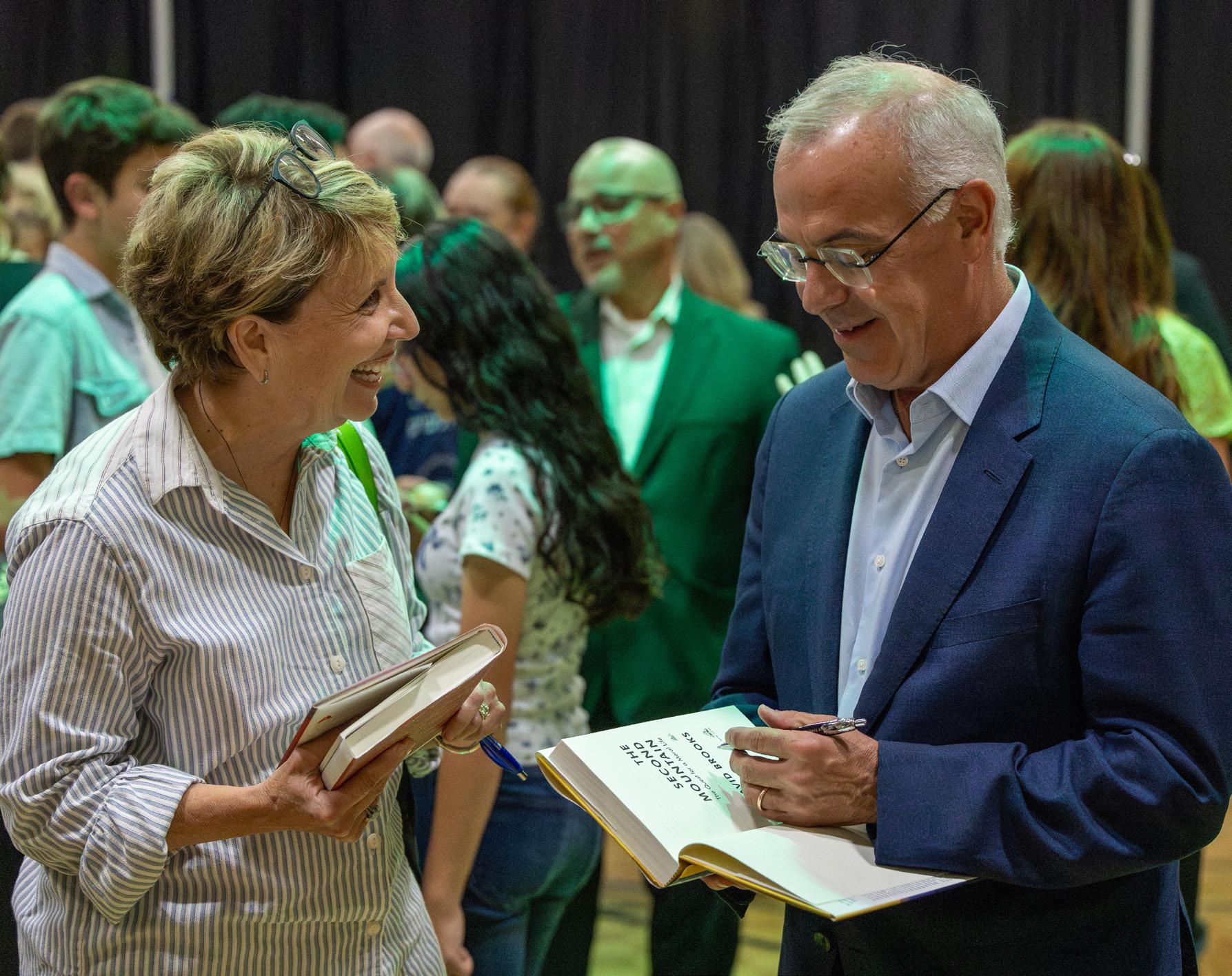
Editor's Note: The Southern Accent has produced a four-page Collegedale News section this issue as part of a national initiative to enhance community news coverage. The local effort, led by Southern's School of Journalism and Communication in conjunction with the Center for Community News (CCN) at the University of Vermont, places student journalists at the forefront of addressing the news desert crisis, a phenomenon caused by the decline of newspapers in local communities. The Accent believes local news is vital to a thriving democracy, and we remain committed to reporting about important issues, novel occurrences and interesting people in the greater Collegedale area. We will publish this special section in five issues of the newspaper this semester. To submit tips or press releases, go to https://southern-accent.org.
On a recent Wednesday afternoon, at the Collegedale Municipal Court, seven individuals appeared before Judge Kevin Wilson for court dates related to the human trafficking charges against them.
The defendants—arrested as part of Operation Enduring Justice, an initiative launched by the federal government in 2024—were among 11 individuals apprehended in Collegedale on Aug. 21. The arrests resulted from a sting operation conducted by the Collegedale Police Department (CPD), Hamiliton County Sheriff’s Office (HCSO), Tennessee Bureau of Investigation (TBI) and Federal Bureau of Investigation (FBI).
According to the City of Collegedale website and police records, those arrested in the sting were: Mustafa Kamil Awda, Juan Castillo Huerta, Smit Kanei Chaudhari, Alejandro Lopez De La Cruz, Crawford James Higdon, Andrew Shawn Hamer, Monquel Domiquce Hughes (whose name is spelled Deomiquce in the photo provided by the CPD), Emerald Starr House, Christopher Jimenez Santana, Tiffany Marie Roberts and Areal Ramos Reinoso, also known as Robert Abraham Campos.
Eight of the 11 individuals were charged with solicitation of a minor after attempting to arrange sexual activity with an undercover cop posing online as a 16-year-old female, according to CPD reports obtained by the Accent. In most cases, the suspects offered monetary payment, except Hughes, who offered alcohol in exchange for sex, according to the police records.
Police documents further indicate:
• The arrestees ranged in age from 19 to 43. Two of the 11 arrestees charged were women, but were not charged with solicitation of a minor
Four of the 11 were listed as homeless, and two provided out-ofstate addresses. Hamer was listed in his arrest report as being homeless from Chattanooga. However, in the incident report documenting his interview with law enforcement, he attested that he was going back home to Murfreesboro from a work trip in North Carolina.
• According to arrest reports, none of the arrestees resided in Collegedale, though eight were Chattanooga residents and one was from Ooltewah.
• According to the Hamilton County Sheriff’s Office, four suspects “failed to meet the citizenship verification requirements” and
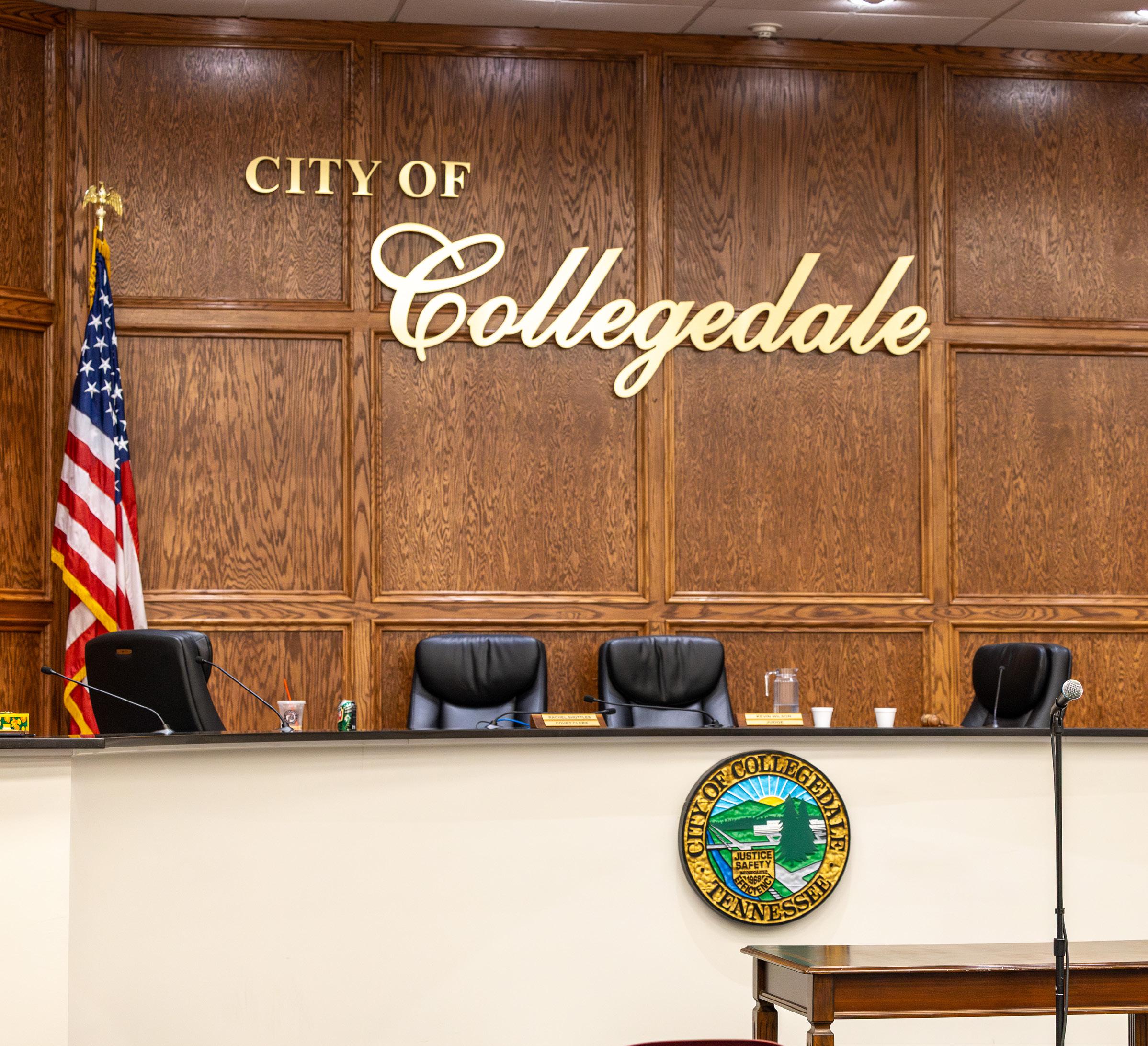
were released into ICE custody.
In a press release issued by the HCSO, Hamilton County Sheriff Austin Garrett stated, “The arrest and later release of these four suspects to ICE underscores the critical importance of our partnerships with local, state and federal agencies and highlights one of the many reasons why illegal immigration must be taken seriously in our Nation.”
CPD Assistant Chief of Police Jamie Heath said the four undocumented individuals have already been deported or are awaiting deportation.
“Because these are federal actions, the state will have no other choice but to dismiss its charges against those individuals,” Heath stated in email to the Accent. “We hope that these charges are properly documented at the federal level so that, if these individuals attempt to re-enter the United States, Tennessee authorities will have the opportunity to pursue prosecution for their crimes.”
According to Collegedale Municipal Court Clerk Rachel Shuttles, all defendants had their arraignments via video court on Aug. 22, and bonds were set at that time. The seven cases still in the Collegedale court system continue to be adjudicated.
“Usually at the first appearance, [defendants] either request a public defender or state their intent to hire an attorney and are then given a new court date,” Shuttles
stated in the email to the Accent. “In this case, it is set for 11/19/25 at 3p.m. No pleas have been entered at this time.”
According to a police officer at the Collegedale Municipal Courthouse, all seven defendants paid bail to stay out of jail while their cases are pending.
“This operation is a sobering reminder that predators exist everywhere – even in small-town America,”
stated.
The Aug. 21 sting operation was just one among several in the area. On March 13, two arrests were made in the Collegedale area in a coordinated human traffic sting, according to a news release from the City of Collegedale.
On May 20, a news release from the City of Collegedale stated that one human trafficking arrest, unrelated to any federal or state sting operation, was made in Collegedale. On Aug. 19, three arrests were made in a human trafficking sting operation the Cleveland area, the TBI reported.
Public Reaction
For the local Collegedale community, such law enforcement operations raise two important questions: Does Collegedale have a human trafficking and/or sex trafficking problem? And, if so, what can residents do to stay safe?
Brent Hildebrand, a 30-year-
old father to three young girls, has lived in Collegedale since he transferred to Southern Adventist University as a premed student in 2014. While he hasn’t noticed a significant difference in the security of Collegedale over the last 10 years, he admits that hearing stories about human trafficking makes him concerned.
“It’s kind of terrifying. You want to be more careful, lock your doors, have security systems, carry guns.”
Hildebrand believes that carrying firearms as well as being proficiently trained and following essential safety protocols is an important part of keeping families and neighborhoods safe. He also encourages Collegedale residents to get to know their neighbors and have a community of people to trust.
While this may be a strategy for some Collegedale residents, Southern Adventist University’s student handbook states that all weapons on campus are strictly prohibited.
“All city, state, and federal laws and regulations governing firearms and weapons apply on university property,” the Handbook states. “Firearms and guns (including, but not limited to, bullet, pellet, BB, and paintball), bows and arrows, blowpipes, knives (or any edged weapon over four inches from bezel to tip), nunchucks, throwing stars, brass knuckles, and any other type of weapon prohibited by law are not allowed on campus. The storage of personally-owned firearms and weap-
ons must occur off campus. Students who violate this policy are subject to university sanctions and fines, and arrest on local, state, and/or federal charges.”
Aubree Hilliard, a Collegedale native, is studying veterinary technology at an out of state online school. After hearing about the local trafficking arrests, she sees the importance of staying protected and informed.
“Stay open hearted, especially like me sitting here by myself, I pay attention to my surroundings. I look at every person who walks by.” She said, “I kind of keep up to date of what’s going on in the city and not to just stand in a small little bubble and not realize what’s actually going on.”
Student perception When some Southern Adventist University students were read headlines published by various news outlets, referring to the 11 individuals arrested in Collegedale and the three individuals arrested in Cleveland, they imagined scenarios not involving cybercrimes.
Marvin Escalente, a freshman information technology student expressed his unease. “What pops [into my mind is] someone getting kidnapped and being moved around, place to place without them actually wanting to get moved around,” he said.
Freshman film production major Aryanna Davis also imagined victims being physically kidnapped against their
Editor's Note: These photos were provided to The Southern Accent by the Collegedale Police Department in a press release.
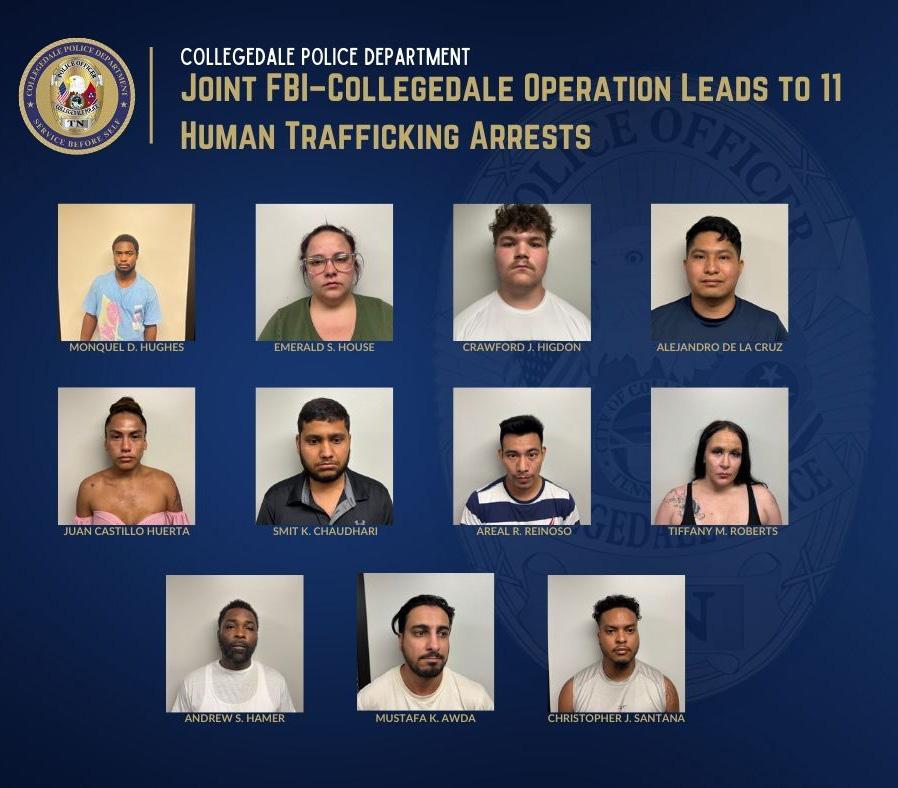

“This operation is a sobering reminder that predators exist everywhere – even in small-town America,” Heath stated.
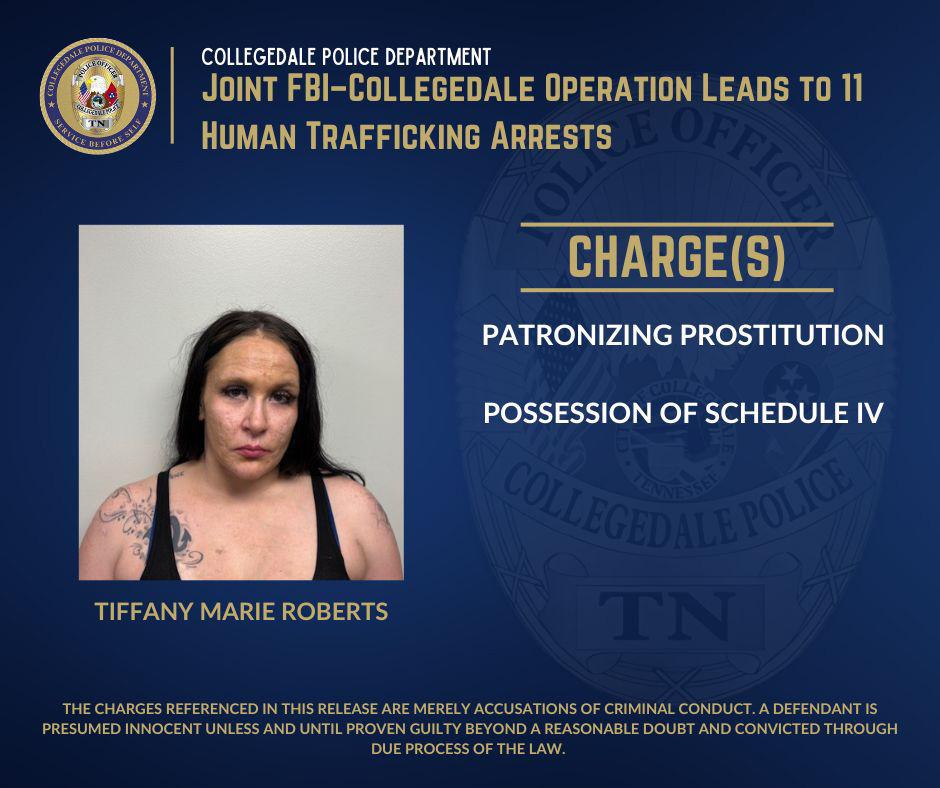


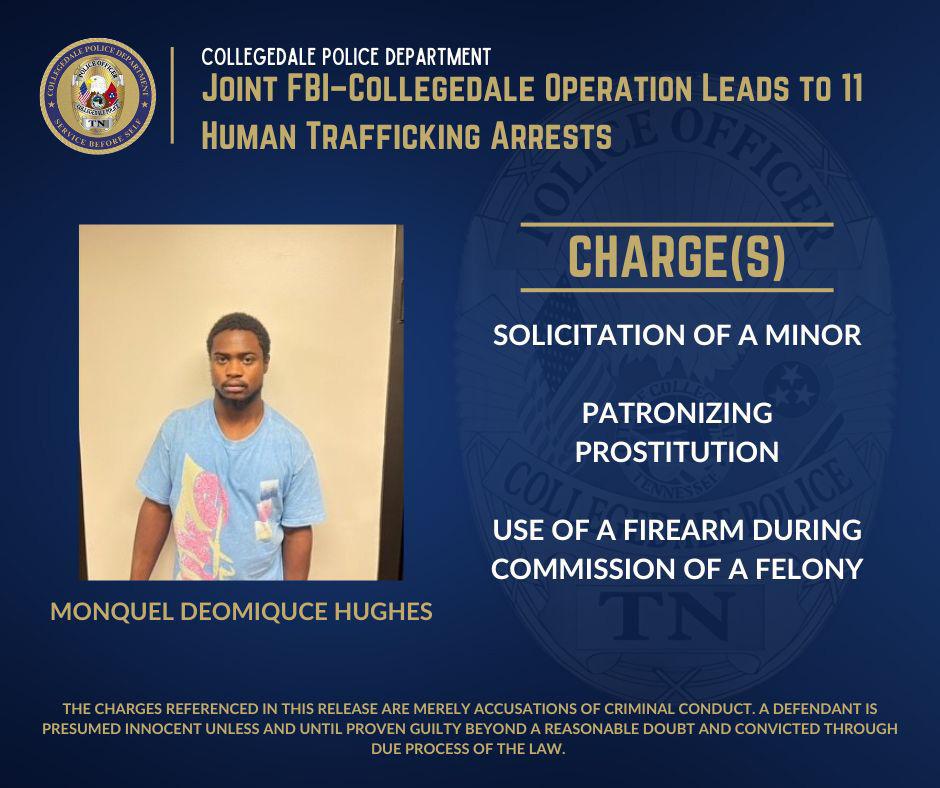



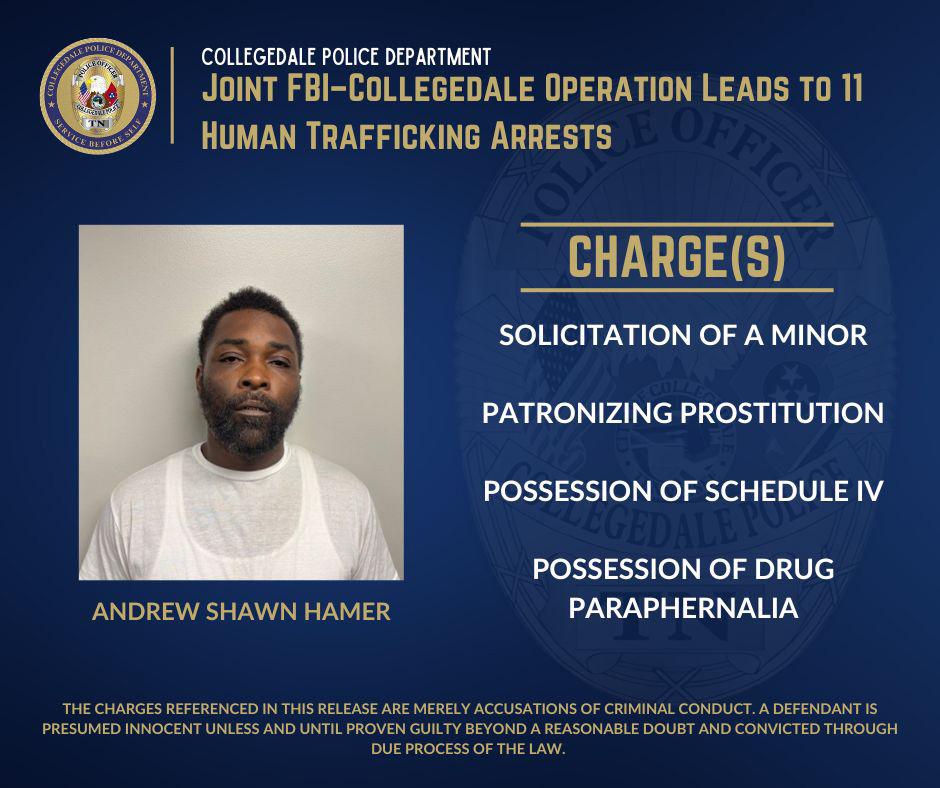


continued from page 4
will.
“[The victims] don't have any connections with anybody else,” she said. “I think of hostage. I think dystopian. I think fear, because that's a huge fear. And the fact that you said 14, that's a big number to me. One is too big, but definitely 14 is humongous, and that sounds scary, especially in a local area like [Collegedale].”
CPD Assistant Chief Heath stated a common misperception among residents is that trafficking always involves kidnapping or captivity of some kind.
However, it relies on “manipulation, threats, and dependency rather than physical restraint.”
“Under state and federal law, human trafficking is defined by exploitation and control, not just abduction or physical force,” he stated. “Any attempt to recruit, entice, harbor, or obtain a minor for commercial sex is automatically considered human trafficking. In these cases, there is no need to prove force, fraud, or coercion because children cannot legally consent.”
Heath then explained, “For adults, trafficking laws apply when there is evidence that sexual services are being arranged or controlled through force, fraud or coercion,” he continued, “Many individuals involved in prostitution are under some form of control—whether physical, psychological, or financial.”
Heath said the Collegedale community has changed significantly over the years.
“Many of us often say, 'This isn’t the same Collegedale we grew up in,’” he said, “and with two operations like this already taking place this year, that statement feels increasingly true- and not always in a comfortable way.”
According to Heath, the CPD will use its resources to take proactive steps against
trafficking, like participating in Operation Enduring Justice, to continue prioritizing the safety of the Collegedale community, especially its children.
“This operation is a sobering reminder that predators exist everywhere – even in smalltown America,” He stated. “The safety and security of our children will always be a top priority, and no community can afford to let its guard down, no matter how safe it may feel.”
After the students received more information about the operation, their feelings toward the arrests did not change.
“Now that I hear that, that's also disgusting,” Davis said. “But the fact that you're so overcome with lust, you don't care [if] you get it from a 16-year-old-girl, and it's disgusting that there was a total of 14 people that they fell short of that kind of greed and disgust.”
Escalente’s thoughts on the arrests also stayed the same.
“...It doesn't change my opinion about it,” Escalente said. “I mean, just the situation happening a little differently doesn't mean it's right...I have a girlfriend. Sometimes I worry about her whenever she goes out by herself. [It’s important] always having something that can help you keep you safe [in] situations, pepper spray can help save your life. Yeah, you never know when something is happening, never going out super late alone, always having an emergency contact just in case.”
University safety measures Campus Safety Director Kevin Penrod stated in an email to the Accent that the sting operation did not uncover any specific threat to students, and the risk of human trafficking affecting students at Southern is low.
“Students and parents should feel confident that we work every day to make this campus a safe, supportive environment,” he said. “At the same time, students should be
aware of the methods traffickers may use, including deceptive offers, online recruitment, and targeting vulnerabilities, such as financial instability, social isolation, and newfound independence.”
Penrod said college students are rarely abducted by force, and traffickers often use online platforms to groom and recruit their victims.
“The key is to remain aware and alert in your interactions, particularly online,” Penrod stated. “While the risk on campus is low, being aware of traffickers’ tactics allows you to prevent and respond appropriately to any suspicious encounters.”
Campus Safety is also planning on updating their procedures to address human trafficking and states that it is their practice, in general, to regularly review their safety protocols to protect the people and property of the university and offer assistance when needed.
“This hasn’t been a prevalent issue in the Collegedale area until now,” he said, “but as we see this issue creeping into the area, we are now looking at what we can do to add training specific to human trafficking situations.”
In general, he encouraged students to participate in ongoing safety workshops,
such the R.A.D. self-defense class, report any suspicious persons or behavior to Campus Safety, and request safety escorts if needed. Penrod also welcomes students to reach out to Campus Safety directly with any questions or concerns.
Facing the judge At the Wednesday court appearance, Higdon and Santana were the only defendants with an attorney present, and some defendants seemed unsure about how to navigate the court system.
Huerta stood alone in front of the Collegedale Municipal Court clerk’s desk filling out pre-trial paperwork. When he didn’t know the meaning of a word, he turned to an Accent reporter and photographer for help.
“Um, excuse me, sorry to interrupt you girls, do you know what this is?” Huerta asked. and pointed to the word “assets.”
Earlier, Judge Kevin Wilson refused to accept paperwork from Roberts, another defendant, because she only filled out the top section. He complained that everyone claimed to be homeless, penniless, owning nothing, with no debt, no employment and no dependents.
“All I know is they want a free
attorney,” Wilson said.
House, a third defendant, stood in front of Judge Kevin Wilson with no attorney present. Wilson reviewed her pre-trial paperwork and asked follow-up questions. He noted that she listed $500 as her gross adjusted income on her tax return and asked what she lived on. “Food stamps,” House replied.
As Wilson continued to ask House questions, she revealed that she was living with her mom and aunt who paid for her housing and utilities. Her mom was on social security and somehow, paid her bail bond. When asked how she paid for gas, House said her car was soon to be repossessed. She said that she had no dependents and was not employed. House didn’t know who would pay for her public defender.
Wilson asked where she got the money to pay for prostitution and was corrected by the other court staff that she was arrested for attempting to get paid for prostitution. House stayed silent.
Wilson asked that she pay her $150 municipal bond by Nov. 19, 2025.
“Good luck to you,” he said as House left the stand. “I know this is hard for you.”
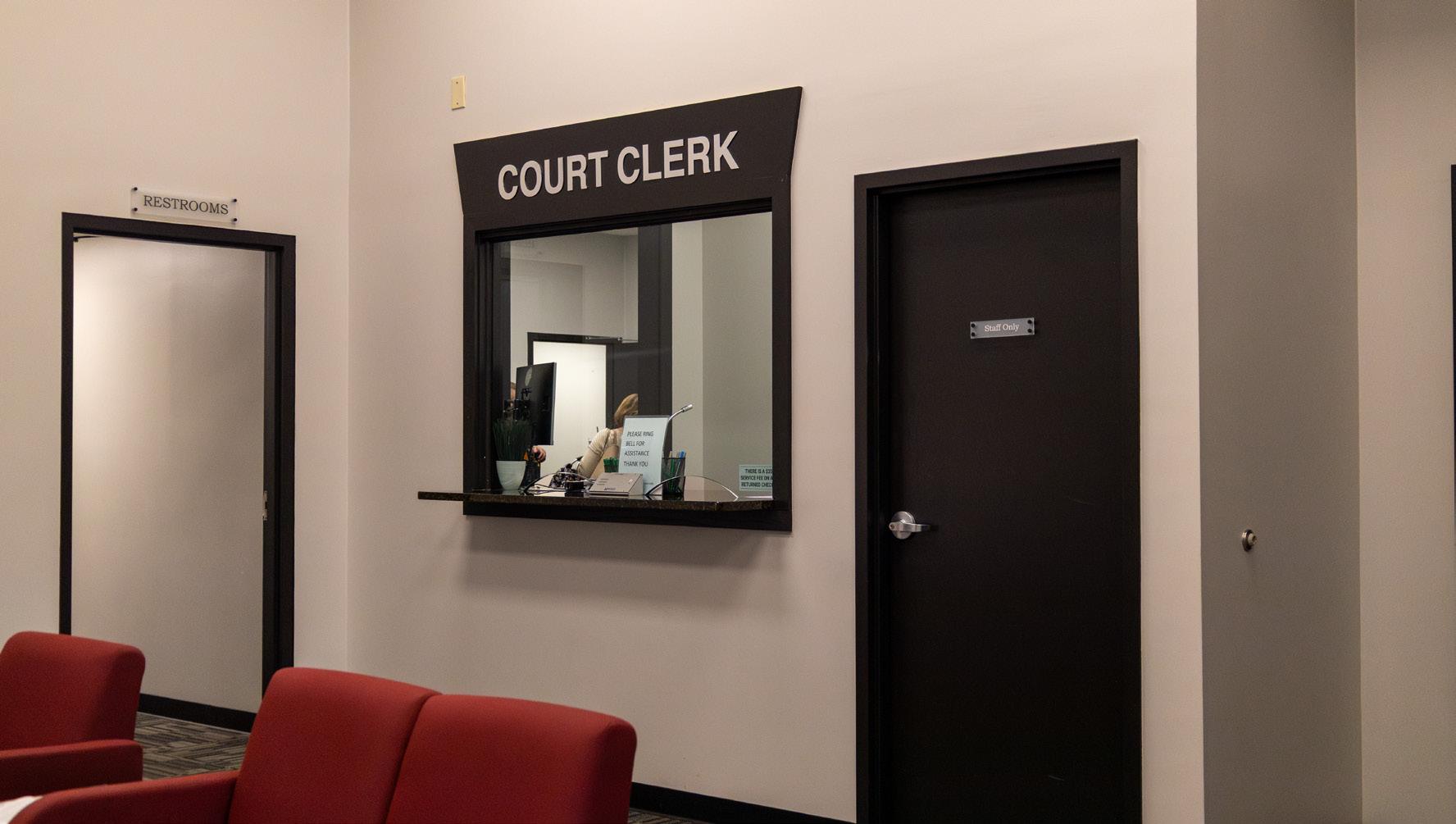
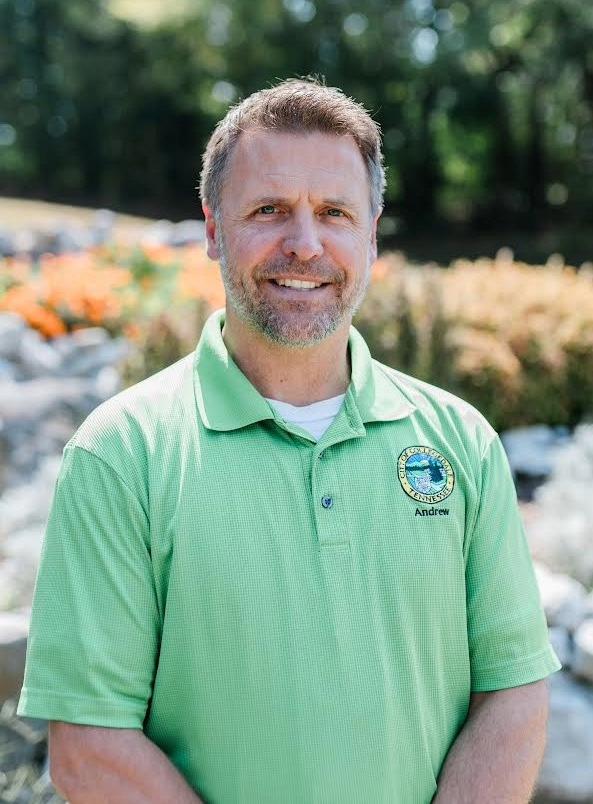
Andrew Morkert has been appointed interim city manager by the City of Collegedale following the unexpected resignation of former City Manager Wayon Hines.
Morkert has served the City of Collegedale for 16 years, most recently as director of building and codes, according to a press release from the commissioners’ office. As interim city manager, he will continue his current responsibilities in critical development and compliance efforts as well as guiding the city’s day-to-day operations during this transitional period.
The Accent reported that Michelle Toro, assistant city manager, financial director and deputy city recorder, was appointed as the interim city manager the night that Hines resigned.
However, according to an email statement from Collegedale Commissioner Laura Howse, Toro requested that someone else fill the role. Howse stated that while Toro is comfortable covering for short vacations, taking on four roles for the next three to four months would be too difficult with only two people in the finance department.
Morkert was nominated by Howse and the motion seconded by Commissioner Debbie Baker at a Sept. 15 commission meeting. According to Howse, Morkert was able to take on the extra work and will be compensated with an additional monthly stipend until
the permanent city manager is appointed.
“I am pleased that the Collegedale City Commission voted to have Andrew Morkert serve as the interim city manager,” said Collegedale Mayor Morty Lloyd, according to the press release. “Andrew is well-respected among his peers and works well with people. His leadership will provide stability during this interim time and allow the commission to focus on finding the best permanent replacement.” According to the Collegedale Board of Commissioners, Morkert has earned a reputation for professionalism, fairness and dedication to public service. The office states that his direct reports consistently highlight his steady leadership and collaborative approach to problem-solving.
In a press release, Jason Allin, staff planner for Collegedale, commented on working with Morkert.
“Working alongside him in our development office has always been a pleasure,” Allin said. “He is not only a strong collaborator on city projects, but also demonstrates professionalism and a positive attitude, making him both a valued colleague and a true asset to Collegedale.”
The Collegedale Board of Commissioners will begin the process of selecting a permanent city manager in the coming months. In the meantime, the commissioner’s office states that Morkert’s leadership will ensure the city continues to move forward with stability and focus.
Many publications, including The Southern Accent, reported that there was a human trafficking sting operation in the City of Collegedale on Aug. 21. However, this has raised questions about the circumstances surrounding the human trafficking arrests.
The Accent submitted a public records request to the Collegedale Police Department (CPD) under the Freedom of Information Act (FOIA) of 1966, to acquire police records, including arrest reports, incident reports and body camera footage. The following are the key findings from the request.
All 11 individuals were arrested for committing cybercrimes in patronizing prostitution, and 10 had additional charges including possession of Schedule II, possession of Schedule IV, possession of drug paraphernalia, use of a firearm during the commission of a felony and most commonly, solicitation of a minor.
The eight arrests involving solicitation of a minor charges were carried out differently than the three cases that did not involve the charge.
Operations involving solicitation of a minor charges
In arrests involving solicitation of a minor charges, the operation began with a female undercover officer establishing contact with the arrestees via an ad soliciting sexual activities on a website, according to police records.
Then, the individual and undercover officer reached an agreement about the act and compensation. The undercover agent revealed that she was acting as a minor before meeting with the individual.
When an agreement was reached, the undercover officer met the individual in a hotel room on Old Lee Highway according to police records. A large stuffed sloth sat on one
of the beds in the hotel room, according to police body camera footage. After engaging with the undercover officer, law enforcement entered the room and placed the individual under custody.
Operations not involving solicitation of a minor charges
Arrestees House, Roberts and Huerta were not charged with solicitation of a minor.
According to police records, the arrestees made contact with an undercover officer through an ad on a website.
The undercover officer and the individuals then negotiated a price for sexual activities. Roberts agreed to bring $10 worth of marijuana.
Huerta brought 1.13 grams of suspected methamphetamine and a glass pipe. The undercover officer and the individuals agreed to meet in a hotel room and after making contact with the undercover officer, officers entered the room and took the individual into custody.
The police records are unclear if these arrestees were offering to pay or be paid for sexual activities.
In Roberts’s case, O’Daniel’s incident report says, “Tiffany [Roberts] made contact with the undercover officer who took the money and the suspected marijuana.” The same verbiage was used in the incident report regarding Huerta.
However, when Roberts was asked if she was working for anyone, TBI Detective Watson’s incident report states, “She stated no. ‘She wasn’t going to give someone else money she worked for.’” It continued, “Roberts also stated that she only did this when she needed money for bills 2 to 3 times a month.”
The incident report documenting Huerta’s interview does not clearly identify if he was attempting to pay or be paid by the undercover officer.
The incident reports about
House are also unclear. O’Daniel’s incident report states, “Emerald [House] made contact with the undercover officer and after giving the money to the undercover officer she took her shirt off.”
However, in Watson’s report, it states that House said she was there because she was contacted through her ad on a website. It also states, “House stated that when she arrived and entered into the hotel room that she received the money.”
Interviews
Once the individual was placed under custody, they were brought to another room where they were interviewed according to body camera footage.
De La Cruz and Santana required a translator to speak in Spanish to and for them,
according to police reports. De La Cruz and Awda invoked their right not to speak without a lawyer present.
Others waived their Miranda rights with the law enforcement, according to police records. Hughes, Higdon and Hamer alleged that they were not aware that the undercover officer they engaged with was posing as a 16-year-old.
Hughes and Reinoso claimed that they believed the officer was 22 years old, though Reinoso remembered the officer sharing that she was 16.
Santana stated that the undercover officer shared that she was 16 years old, but recalled that the ad said that she was 22 years old.
Chaudhari alleged that this was his first time engaging in this behavior, while Santana stated that he has never done this in the United States, but paid for prostitution while living in the Dominican Republic. Huerta stated that he had engaged in this behavior for about 3 years, according to the police report.
Hamer stated that he had used the website when he lived in Mississippi. Roberts stated that she had been involved in these activities for about 10 years and had been arrested in the past for Promoting Prostitution in Hamilton County. Huerta had also been previously arrested for prostitution in Jasper, Tennessee, in another human trafficking operation according to police records.
Chaudhari said that the undercover officer shared that she was 16 or 17 years old with him, but was on the site because the 20 -year-old “had never had sex,” according to an incident report.

Laura Howse Collegedale Commissioner Department’s Honor Guard stood watch over Phil Garver’s ashes during his memorial service, a moving display of valor and dedication. And when a leaking drinking fountain at Veterans Park was wasting water, Andrew had it repaired within an hour— not just shut off, but repaired.
Collegedale Is Moving Forward
I was introduced to someone recently who expressed concern about the state of the city. Let me be the first to assure you: Collegedale is in a really good place.
Of course, we can and will improve, but I know my fellow commissioners and I work every day to make Collegedale the best place to live and raise a family.
We recently appointed Andrew Morkert as our interim city manager. Andrew has served the city for 16 years in various roles, serves on the board at the Samaritan Center, and volunteers regularly in our community. He is widely respected among city staff as a collaborative team player. At the library’s recent open house, the interim library director noted how much it means that Andrew stops by, learns staff names, and checks on upcoming programs.
Sometimes the person we need is right in front of us. I am thankful Andrew was willing to serve in this increased capacity, and I hope you’ll join me in praying for his success.
This past weekend offered two reminders of what makes Collegedale special. The Police
In recent weeks, our Finance director, Michelle Toro, completed an external audit that passed with flying colors and began pursuing the Leaning into Communities grant, which will soon be on our agenda. Our Public Works Director is making major progress on long-delayed infrastructure repairs, our IT staff is strengthening library services, and aviation engineers are fixing airport development issues without additional taxpayer costs. We’re also working closely with TDOT as the Greenway under the Apison Pike bridge nears completion. Collegedale is thriving. While challenges arise—as they always do—this specific commission, alongside our staff and partners, is addressing them head-on. I am proud to serve here, and I am confident our best days are ahead.
- Commissioner Laura Howse




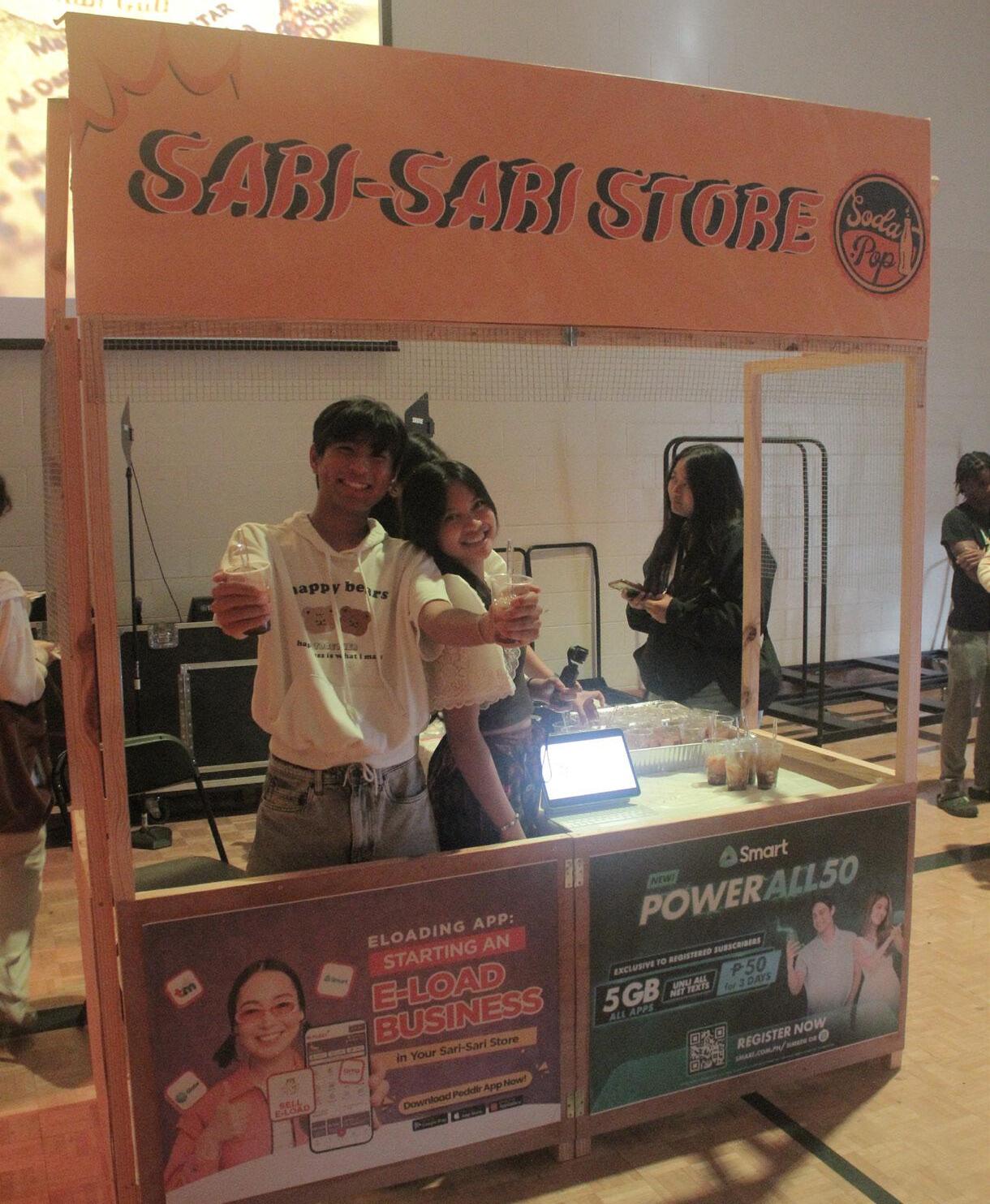

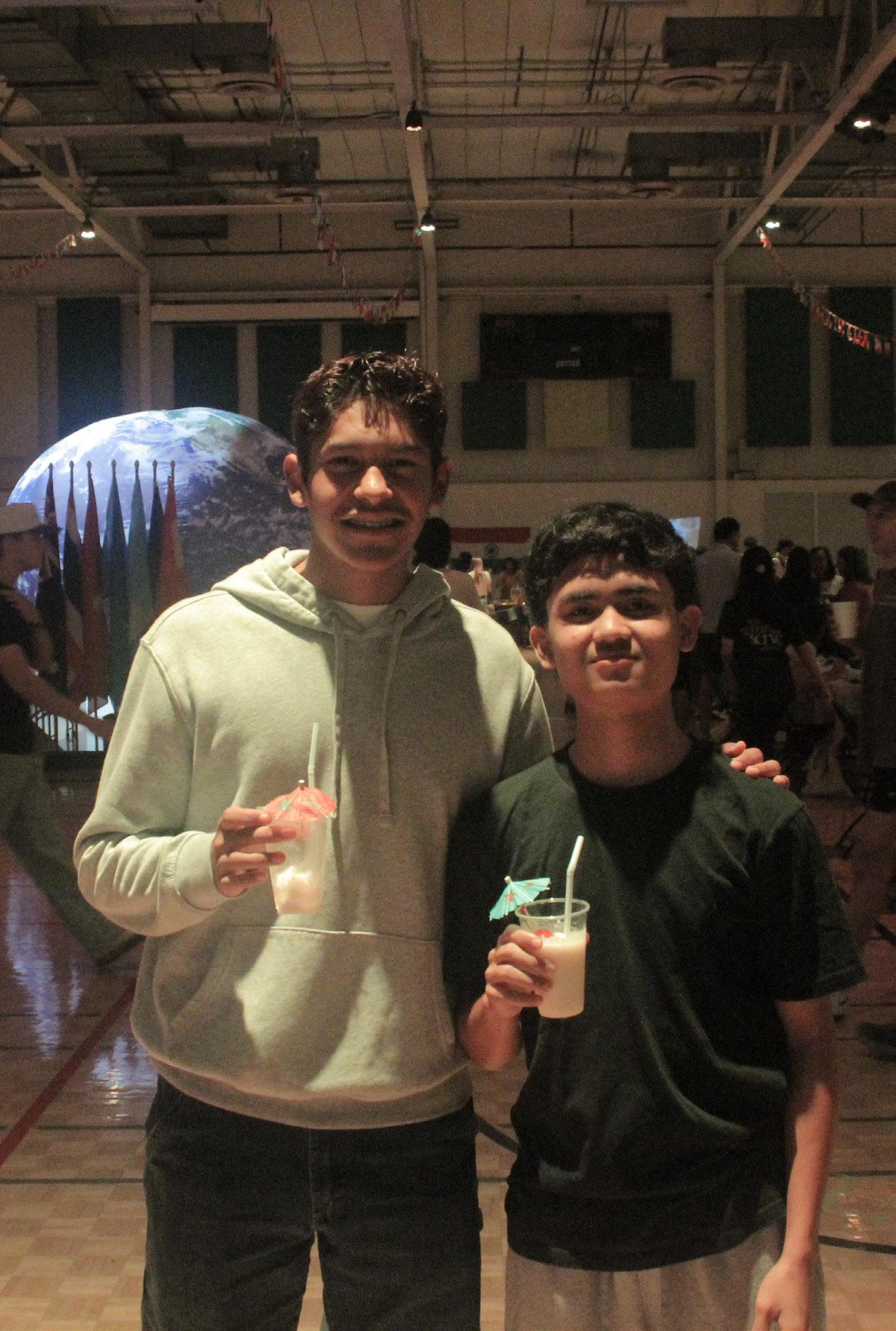
Abby Dizon Contributor
Some people hesitate to exercise even though research has shown that physical activity is beneficial in improving mental and physical health. They may feel physical activity takes too much effort or causes more damage to their self-esteem.
However, I find that exercising provides an outlet for stress. It lets me release pentup emotions, clear my mind, develop focus and implement creative ideas. Studies have shown that exercise stimulates portions of the brain associated with the hippocampus, which is linked to memory. The more you
remember, the more you can draw from your creative imagination. Also, physical activity boosts confidence. Initially, engaging in physical activity may be intimidating if you are unsure about what you are doing. However, by staying consistent, you develop strength and skill. As you progress and feel
more capable, your self-esteem naturally improves, leading to a more positive self-image. Here are some tips that have helped motivate me to incorporate physical activity into my daily routine: Commit to at least 10 minutes of exercise. This is a short, manageable block of time that goes

to therapy
can be a
by faster than you expect. After the initial 10 minutes, you might find yourself in a different mindset, giving you the option to stop or continue exercising. The saying, “You’ll thank yourself later, once it is done,” applies both mentally and physically. Physically, you might not achieve an ideal body after one workout, but you are 1% closer to accomplishing your goal. Additionally, you will feel better about yourself and will have more energy and focus after a workout session. Mentally, you will thank yourself for completing the exercise. Even if you lack motivation before and during the workout, you will feel more accomplished and positive about yourself afterward than if you skipped the workout and felt regret.
In college, stress can take a toll on your mental and physical well-being. Incorporating physical activity may seem like the last thing you would want to do to boost your mental health, but regular exercise provides a valuable outlet for stress, enhances memory and boosts self-esteem and confidence.
By incorporating exercise into your routine, you not only improve your physical health but also cultivate resilience and foster a happier, healthier mindset throughout your college journey.
Matthew Taylor Sports Editor
Southern Adventist University has long stood apart from many American campuses, including Christian and Adventist universities, because of its approach to athletics.
Instead of investing resources into varsity teams to compete against other universities in intercollegiate leagues, Southern has instead focused on a robust intramural program.
One of the many purposes of intramurals is expressed on SAU’s page: “The ultimate goal is to give glory to God.” This statement raises an intriguing question: How can a student athlete give glory to God through participating in varsity sports or intramurals?
In 2013, this conversation was thrust onto a national stage when Hall of Fame NFL linebacker Ray Lewis addressed his faith during media day before Super Bowl XLVII.
“I don’t believe [God] picks a winner or not,” shared Lewis. “What I do believe is that if you give him true credit to say ‘Whatever your will is, so be it.’” Lewis is far from the only athlete to credit God for their victories. When receiving the award for the Most Valuable Player in the NBA in 2019, Giannis Antetokounmpo thanked God for “blessing me with this amazing talent,” and sharing that “Everything I do, I do through Him. I’m extremely blessed.”
This sentiment can also be found on an international scale, as Olympian gymnast Simone Biles also credited God with her success. During an interview
with Christian Broadcasting Network (CBN), she shared, “I believe God gives every individual something special and mine was talent. So, never take it for granted.”
So, what does the Bible say about sports and competition?
The New Testament contains several references to athletic imagery. Paul compares the Christian life to running a “race” in 1 Corinthians 9:24–25 (NIV) and again in 2 Timothy 4:7 (NIV), demonstrating how familiar he was with the athletic culture of his time. He uses these metaphors to emphasize
discipline and perseverance. At the same time, Scripture warns against unhealthy ambition. Philippians 2:3 (ESV) says, “Do nothing out of selfish ambition or vain conceit. Rather, in humility value others above yourselves.”
In 1988, the General Conference Executive Committee discussed the Adventist Church’s stance on competitive sports. One of the first major conclusions this committee came to was that “Christians should function with the highest motives in their quest for athletic excellence,” encouraging
believers to pursue sports with integrity and purpose.
While supportive of friendly games, the committee expressed concern about varsity athletics and interschool league play, cautioning that “the inherent hazards of competitive rivalry have the potential to be exaggerated.”
The conversation about Christianity’s role in sports is both complex and meaningful. Scripture reminds believers not to take pride in their own accomplishments but give glory to God in every area of life, which is a principle echoed
by many athletes on the world stage. At the same time, the Adventist Church has cautioned against the dangers of rivalry and division that can emerge in competitive settings, while affirming the value of fellowship and recreation through intramurals.
Southern Adventist University’s approach reflects both biblical counsel and the General Conference stance, offering students a way to enjoy athletics while keeping their ultimate focus on Christ.

Andrew Francis Contributor
This summer, I learned that the Seventh-day Adventist Church is beautifully colorful.
While attending the 62nd General Conference (GC) Session during July in St. Louis, Missouri, I was further exposed to how diverse the different conferences, ministries, people and personalities are in our church. The mission of Adventist pioneers such as J.N. Andrews and Ellen White—to carry the gospel to the whole world—has largely been a success, resulting in the astounding growth of the church across Africa and South America.
Institutions like Southern Adventist University, Andrews University and Union Adventist University showcase with pride
their cultural diversity. While touring the GC Session’s exhibition hall, I witnessed how diverse the traditions of Adventism are. I saw outreach through education, sports, books, social media, games and a variety of other professions. In worship, too, there is variety: Contemporary Christian Music (CCM) has grown exponentially within and beyond Adventism, becoming one of the most trending music genres on streaming platforms. Gospel music has been a mainstay for decades for many congregations and for members who desire a bit more tempo in their praise. The classic hymns are still sung and are far from forgotten, as they often inspire newer compositions. Our churches and school campuses are blessed to have


these worship styles and others represented through various ministries and fellowships.
The Hues of Worship However, I have also, unfortunately, come across church members or visitors being disparaged by Adventists because they did not fit in with the preferred traditions that were in place, even when those preferences have no biblical basis. Complaints range from “The music was too slow,” or “Why was that instrument used?” to critiques about skirt length, “flashy” attire, sermon duration, or a praise leader being “too performative.”
It is sometimes fair and understandable to critique things in our public church services. However, I think we often lose sight of the point of ministry and church services, which is not pleasing ourselves or our traditions. As Jesus reminds us in Mark 2:27, “The Sabbath was made for man, not man for the Sabbath.” The point will always be to praise God.
Questioning the sincerity of someone else’s praise or insulting the way people conduct worship does not increase your own authenticity and holiness. Once a person or congregation reads the Bible and seeks to honor God according to biblical principles, the quality of their worship is ultimately between them and God. Being overly concerned with the spiritual lives of others distracts from the “beams” in our own eyes that Christ spoke about in Matthew 7:3-5.
Instead, if any significant issues arise that do not concern aesthetic preferences or the abandonment of tradition,
God tasks us in Matthew 18:15 with peacefully approaching one another privately to correct something that has been done contrary to the Bible.
Not every religious or cultural dispute will be easily resolved. However, I do believe there is a spectrum of Adventist beliefs and practices that does not compromise our core, fundamental doctrines.
Much of the tension present across this spectrum could be reduced through uniting on the aspects that matter: valuing the message of the Gospels, using God’s word to cultivate a personal and loving relationship with Him and sharing that love with the people near to us and far away.
These values ought to be translated into our secular discussions. In the United States, the separation of church and state is decreasing, and we are witnessing more intertwining of political and religious beliefs.
I do think it is important for every member to be engaged and aware of civil and political matters, since it is a way for Christians to follow the several examples Christ left of adequately understanding the people and groups that we need to minister to.
However, we must guard against letting politics become an idol. Letting our understanding of social and civil matters become too much of a focus can drive some to act in ways that are unlike Christ.
The heated and toxic nature of today’s political discourse should be a warning about how we carry out disagreements within the Church. The recent assassination of political commentator Charlie Kirk, a
self-proclaimed Christian who had recently garnered attention from some Adventist communities, is a sobering example of what happens when mutual respect for differing perspectives is not appreciated.
I strongly believe that no human should ever determine whether someone lives or dies. And although many of Kirk’s statements were widely viewed as misogynistic and racist, he is still included in that belief. Unfortunately, many are choosing not to ignore his problematic stances, leading some to question why so many are grieving.
Let God Be the Judge I do not want to see a denomination where members feel compelled to hurt one another or celebrate the departure or death of fellow believers or leaders with whom they disagree. If we become more tolerant of the broad spectrum of Adventist traditions and cultures and focus on what God wants us to prioritize, it will prevent us from offending one another.
Jesus commissions us in Matthew 28:19-20 to love and share the Gospel, not make people conform to what our definition of being “more Adventist” is. Let God be the judge of our hearts, since He is the only one who can truly evaluate them (1 Samuel 16:7).
The original version of this editorial was published in the Andrews University Student Movement, the official student newspaper of Andrews University. Andrew Francis serves as the managing editor at the Student Movement.
Melissa
Hernandez Contributor
Sabbath afternoons are some of my favorite hours of the week, especially when they involve a hike. During my first week here for the semester, that’s how a few friends and I spent our Sabbath afternoon. As expected, the path contained lots of obstacles, so we were careful. After a while, we started to talk about the morning’s sermon and sang songs together. But as time went on, our attention drifted and we became more absent-minded.
Eventually, we grew bored and decided to explore another path. We paid more attention to what was on the ground ahead, looking for things that could trip us. What we didn’t notice, until one of my friends pointed it out, was a large spider hanging over us. We pushed forward, but more spiders guarded the way. On our way back, we noticed all of the spiders we had walked under. And for the first time, we looked out for each other, pointing out where the next spider was so we wouldn’t stumble into its web.
This experience reminded me of Proverbs 27:17, “As iron sharpens iron, so a friend sharpens a friend.” On that hike, my friends would look out for me when I couldn’t see a spider ahead. In the same way, God blesses us with friends to keep us accountable as we navigate life.
Friends help us be more honest, spot those sins and stay on the right path. Good friends are willing to direct us towards the truth, even when we don’t want to hear it. But just as iron must have friction to be sharpened, so do we as Christians. This sharpening is an act of love and
sometimes uncomfortable, but we should do it in love, just as others speak the truth in love.
Sometimes, we are so focused on the small things and faults of others that we overlook the sins we commit. Just as my friends and I were so focused on the trail under our feet, we can become consumed with pointing out others’ faults. We notice the “obstacles on the ground” but fail to see all the “spiders above” in our own lives.
In Romans 2:1 (NKJV), Paul says, “Therefore you are inexcusable, O man, whoever you are who judge, for in whatever you judge another you condemn yourself; for you who judge practice the same
things.” The key is where we choose to fix our eyes. Just as we were able to spot the spiders around us the moment we looked up, Jesus helps us spot our sins the moment we look up and focus on Him.
Psalm 123:1 (NKJV) says, “Unto You I lift my eyes, O You who dwell in the heavens.”
Once we look up to Him, we begin to see our sins clearly. And we are then able to walk with Him to confront those sins, with the friends He has blessed us with on the way to encourage, correct and sharpen us.

Rhett Seitz Lifestyle Editor
Madonna released her iconic hit song “Material Girl” in 1984, satirizing the role wealth and materialism play in modern life. While we still live in a world shaped by materialism, that phrase could easily be updated for today’s era: We live in an AI world. It’s no secret—artificial intelligence is everywhere. It has transformed our daily lives and flipped the world upside down, for better or worse. And it’s not going anywhere anytime soon. (I even used AI to confirm that Madonna fact…shocker.)
As college students, you would be living under a rock if you didn’t know how to leverage AI to support your learning. Whether you ask AI to help explain concepts or use it to create a schedule for you, learning has never been easier.
Students aren’t the only ones using AI, as professors are increasingly embracing it. But the rise of AI brings an important question: How far is too far? And I don’t just mean in academics—I mean in life.
When I first started using ChatGPT, I became hooked. I relied on AI for almost everything: asking life advice, choosing what to wear, deciding when to go to bed and more. If I were to show you my chat history, there would easily be 15-20 conversations per day as I ask ChatGPT questions.
But as I started to rely on AI more, I started to notice a shift. I depended on AI so much that I became lazy. I didn’t want to think deeply or tackle tasks that
required time and effort. It was all in the name of efficiency, convenience and time management.
For example, I could easily have used AI to write this article for me. But then I would have had to ask myself: Why would I even have this job if AI did that for me? (There goes my job security in the future.)
Sure, AI can save time and even make you more employable, but it also raises questions about creativity and personal skill. Where does natural talent end and AI’s influence begin?
Practical Advice for Using AI
1. Use it—but wisely. AI is a powerful tool for learning, productivity and problem-solving. It is almost a must in today’s work world. Embrace it, as it may take you to places you would never have imagined. But don’t let it replace your own thinking. Don’t let it replace you. You are and always will be better than AI.
2. Understand what the AI is doing. A professor in the School of Computing, Scot Anderson said, “You have to be smarter than the tool you are using.” This is especially true for coding but applies to all AI applications. If you blindly follow AI without understanding the reasoning behind it, you risk making mistakes or missing learning opportunities.
3. Maintain your critical
thinking skills. AI can offer suggestions and speed up tasks, but it should not replace your judgment. Challenge its answers, compare multiple sources and most importantly, think through problems yourself. Don’t outsource your powers of evaluation to a machine.
4. Use AI for efficiency, not dependency. Let it handle repetitive tasks, draft ideas or provide guidance—but don’t let it do all the thinking. Schedule time for independent
work to keep your brain sharp.
5. Set boundaries. Avoid using AI for personal decision-making that affects your life in meaningful ways. Examples include relationship advice, major financial decisions or moral dilemmas. AI lacks context, empathy and lived experience.
6. Remember what is eternal. AI is powerful, but not permanent. AI will pass once Jesus returns. Won’t we spend eternity asking the King of the
universe everything we wanted to ask while on Earth? Our loving Lord and Savior provides guidance and care that no algorithm can replicate. Use AI but never forget where ultimate wisdom comes from. And while AI can and may do a lot of things, it will never die on a cross for your sins or give you eternal life. Never let AI replace the relationship that Jesus wants to have with you.

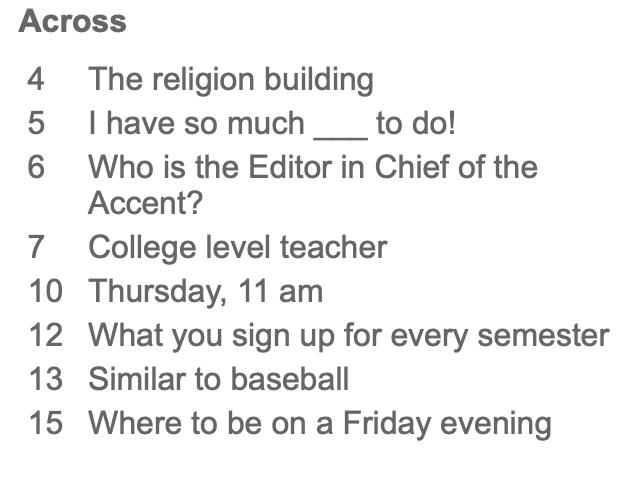

Created by Nyah Jackson



Hickman Science Center Parking Lot


• 8:30 pm Vespers: Fall Week of Worship @ Collegedale Church of Seventh-day Adventists Payday: Salary
• Nothing Scheduled
Wed

View Southern (September 25 - 26)
11:00 am Convocation: Fall Week of Worship @ Collegedale Church of Seventh-day Adventists
• 8:00 pm Fall Week of Worship @ Collegedale Church of Seventh-day Adventists

• 10:00 am SOAP: Canoeing, Outdoor Church @ Wright Hall 11:45 am Merge Worship @ Collegedale Academy Elementary Gym 11:45 am Renewal @ Collegedale
Church of Seventh-day Adventists
7:00 pm Evensong: Alumni Spotlight @ Collegedale Church of Seventh-day Adventists
8:30 pm “For Love of the Game” Softball Tournament @ Summit of Softball (Off-Campus)

• Flag Football Season Begins
Futsal
6:00 pm
- No Manches United vs Paysandu (Co-Ed)
- Mo Salah vs PRN FC (Men’s B)
7:00 pm
- Cooked vs Nutmeg Nation (Co-Ed)
- Chopped FC vs Chicken Tikka Mo Salah (Men’s B)
8:00 pm
- Team 3 vs Crudinhos FC (Men’s A)
- Beans and Rice vs Shalom Yahweh FC (Men’s B)
9:00 pm
- Sal Survivors vs Copacabana FC (Co-Ed)
- LNFR vs Inshallah (Co-Ed) Softball
6:00 pm
- LPC vs Soft Launch (Ladies’)
- Outta Your League vs there’s no place like home (Ladies’)
- The Foul Balls vs Trey Tucker (Men’s B)
7:00 pm
- Moneyballers vs Jorts Boys (Men’s B)
- Team Rocket vs The Hardballs (Men’s B)
- Swingerz vs Let Andrew Hit (Men’s A)
8:00 pm
- Pitch Perfect! vs Southern Breeze (Ladies’)
- Batties vs Bat Biddies (Ladies’)
- Tiger Balm vs Old School (Men’s B)
9:00 pm
- Handball vs Base Babes (Ladies’)
- FOUL PLAY vs Las Batties (Ladies’)
- Bomb Squad (Segarra) vs Shalom Yahweh (Men’s B)
Last week, in the “Charlie Kirk’s death prompts reactions from the Southern Adventist community,” article, The Southern Accent misattributed a quote. In the article, Bob Young, senior vice president for Academic Administration, was quoted on the front page. However, the words were said by Greg Vital, Tennessee State Representative.
